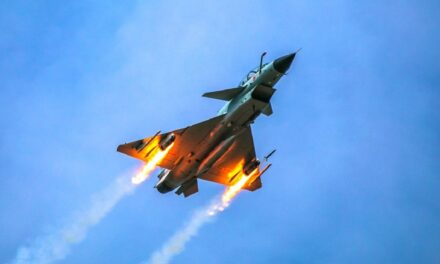We support our Publishers and Content Creators. You can view this story on their website by CLICKING HERE.
September 27, 2020 began as a quiet Sunday morning in Nagorno-Karabakh, a mountainous Armenian-populated region that, at first glance, looks like Switzerland: Green field, rolling farms, and snow-capped mountains with churches and monasteries dotting mountainsides. It was just days after the 100th anniversary of the Ottoman invasion of independent Armenia at the tail end of the Armenian Genocide, but that anniversary had passed with minimal bluster from the Turks and the Azerbaijanis.
Then the explosion began, Nagorno-Karabakh Armenians described to me when I visited weeks later. Utilizing Israeli drones and munitions, Azerbaijan launched a surprise attack on the self-governing Armenian enclave, the first of many times over the next three years in which Azerbaijan broke ceasefires until it completed Nagorno-Kabarakh’s ethnic cleansing.
Anger toward Israel remains deep among the Nagorno-Karabakh refugees, Armenia proper, and the broader Armenian community.
Frankly, they are right. Israel is one of the dwindling number of Western countries that does not recognize the Armenian Genocide. That anger has persisted as Azerbaijan has systematically began dismantling Armenian churches and sandblasting inscriptions on monasteries, some over a millennium old. It was a short-term and self-defeating strategy on Israel’s part, as Israel’s backing of Azerbaijan’s ethnic cleansing of Nagorno-Karabakh Armenians and destruction of cultural heritage created a precedent that could be used against Jews living in the West Bank, especially among Palestinians who deny any Jewish connection to the land.
Israelis—commentator Mordechai Kedar, for example—may argue that Azerbaijan is a haven for Jews, but this is increasingly false. The arguments Kedar relies upon outdated numbers and repeats the same tactics Iranian partisans used to argue that the Islamic Republic was simply anti-Israel, not antisemitic. The reality is that Azerbaijan has hemorrhaged its Jews for a reason. When population statistics remain unchanged for decades on end, it is a sign those statistics are outdated if not false.
Nor do Israel’s realist arguments to justify the Israel arms-for-Azerbaijani hold water. Azerbaijan may once have been a crucial source of energy for Israel, but the Abraham Accords opened new channels absent the moral baggage inherent in helping a racist dictator eliminate a minority community. Privately, all but those wanting something Azerbaijani President Ilham Aliyev acknowledges how repressive and unhinged Aliyev has become; Aliyev himself does not try to hide his agenda. Nor does Israel show itself cognizant of Azerbaijan’s true role when Turkey’s President Recep Tayyip Erdogan openly plans violence against Israel and bolsters Turkey’s own domestic military industry but uses Azerbaijan to continue trade with the Jewish state. Israel needs to remove its strategic blinders: Every Israeli delivery to Baku provides technology Ankara can use against Jerusalem.
Israel’s complicitly in Nagorno-Karabakh’s ethnic cleansing represents a stain not easily removed, but it can also provide a lesson not to repeat: Short term deals with Israel’s ideological adversaries do not bring peace; instead, they embolden enemies. Turkey may present one face to tourists in Istanbul, Bodrum, or Antalya, but ideologically, it works to eradicate Middle Eastern minorities, be they Armenian or Chaldean Christians, Syrian Kurds, Yezidi, Alawi or Jews.
Syrian Kurds now face existential peril as the Turkish army bares down. Turkey’s accusation that the Kurds represent a terror threat is nonsense; rather, Turkey objects to the Kurds’ liberalism, their self-governance, and their rejection of Erdogan Muslim Brotherhood-inspired Islam, an interpretation of Islam historically foreign to the region.
Israeli officials have previously offered rhetorical support for the Kurds, but words only go so far. If Israel can deliver near monthly weapons shipments to Azerbaijan amounting to 70 percent of Azerbaijan’s arsenal, then Israel can provide Syrian Kurds with anti-aircraft missiles, drones and anti-drone technology, and landmines to stymie the Turkish advance.
For Israel to do nothing in the face of the Turkish onslaught would be both a moral stain and a strategic disaster. Jerusalem simply cannot systematically betray every Middle Eastern minority and expect support when its turn comes. And Israel’s turn is coming. Both Erdogan and Iran’s Ayatollah Ali Khamenei have made clear they are gunning for the Jewish state.
The Syrian Kurds proved they are a force amplifier when they led the defeat of the Islamic State. They were a tremendous force amplifier for the United States. They can play the same role for Israel against Turkey and help repair the reputational damage the Jewish state suffered 15 months ago among adversaries and advocates alike in Congress and in the Middle East when Azerbaijan and Turkey ran roughshod over the traditional heartland of Armenian Christianity.
About the Author: Dr. Michael Rubin
Michael Rubin is a senior fellow at the American Enterprise Institute and director of policy analysis at the Middle East Forum. A former Pentagon official, Dr. Rubin has lived in post-revolution Iran, Yemen, and both pre- and postwar Iraq. He also spent time with the Taliban before 9/11. For more than a decade, he taught classes at sea about the Horn of Africa and Middle East conflicts, culture, and terrorism, to deployed US Navy and Marine units. Dr. Rubin is the author, coauthor, and coeditor of several books exploring diplomacy, Iranian history, Arab culture, Kurdish studies, and Shi’ite politics. The author’s views are his own.

 Conservative
Conservative  Search
Search Trending
Trending Current News
Current News 





